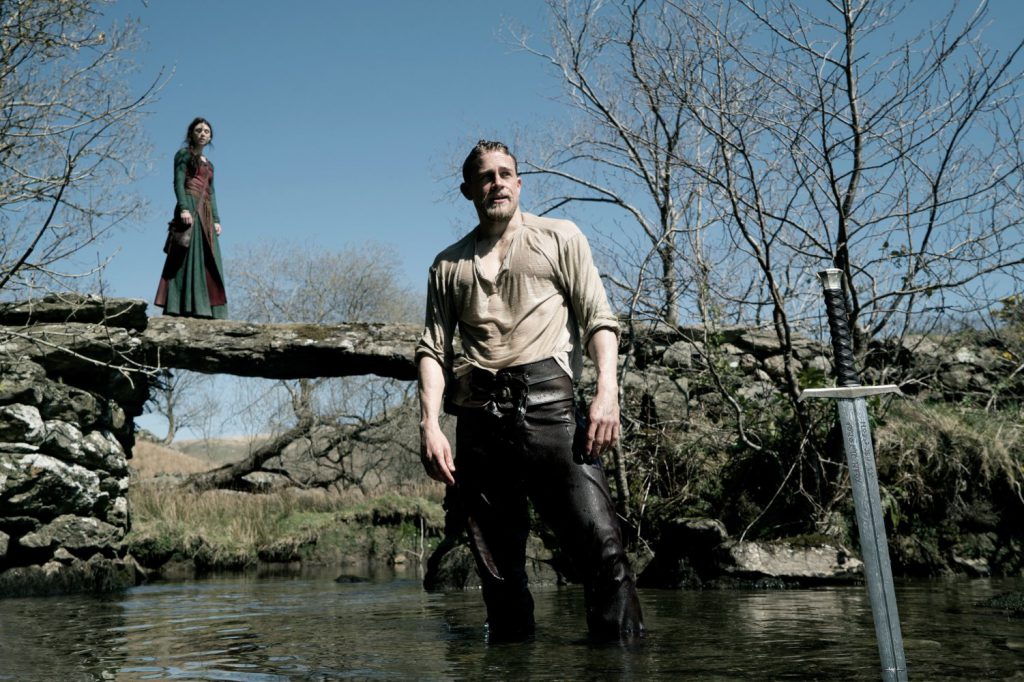King Arthur: Legend of the Sword
Directed by: Guy Ritchie
Starring: Charlie Hunnam, Astrid Bergès-Frisbey, Jude Law, Djimon Hounsou, Aidan Gillen, Tom Wu, Kingsley Ben-Adir, Neil Maskell, Annabelle Wallis, Eric Bana
Rated: PG-13 for sequences of violence and action, some suggestive content and brief strong
“King Arthur” is pretty much everything you could want from a medieval Guy Ritchie film. More magic and castles, but still lots of action, sharp and fast dialog, and a gathering of loosely-connected plot elements into a tight finish. It’s a very loose adaptation of the story of King Arthur, but it succeeds at what it aims for: smashing Ritchie’s style together with a mostly straight-forward medieval fantasy story. Think of Richie’s “Sherlock Holmes” movies, but Arthurian rather than Victorian.
The film starts with some backstory – an attempt at world domination by a Mage, the betrayal and murder of King Uther (Eric Bana), the King’s only son left to be found and raised by commoners. We get a montage of the son, Arthur, as he grows up from a toddler (Zac and Oliver Barker) to a man (Charlie Hunnam). Anybody who knows anything about King Arthur’s legends knows what happens next: he pulls a magical sword from a stone, which tells everybody that he’s the heir to the throne. The only problem, beside the fact that King Vortigern (Jude Law) has no intention of stepping down in favor of his nephew, is that Arthur has no interest in taking over. Fate doesn’t much care about what he wants, though, and neither does the anti-Vortigern resistance.
There’s a lot to like about “King Arthur: Legend of the Sword.” The cast is diverse, the female characters aren’t all identical (though the film does fail the Bechdel test, in which two named female characters have a conversation that is about something other than a man), and the production values are high.
Charlie Hunnam is the one who has to carry the film, though, and he does. Arthur a pretty standard Ritchie protagonist of the taciturn and reluctant type, and Hunnam makes Arthur’s struggle to accept his fate understandable. Arthur was perfectly happy running his territory, protecting his friends, and getting a cut of everybody’s profit. He has no desire to be part of the resistance, let alone head it up as the “Born King.”
The Mage (Astrid Bergès-Frisbey) offers him counsel and some increasingly-cool magical support, pushing him to do the internal work necessary to wield Excalibur and become king. She’s an interesting character, especially because she has no interest in Arthur romantically – and there’s no interest in the other direction, either. She knows that Arthur has to go through a harrowing process (including a very dangerous vision quest in an alternate realm) to let go of his old life and become the Born King, and is determined to get him through it. Bergès-Frisbey’s intense performance is both practical and otherworldly. The Mage has no romanticism in her, no softness. She’s all hard edges and enchanted wildlife, and it’s a nice change from the standard sexy-lady-in-a-corset fantasy type.
If you like Ritchie’s style and also like medieval fantasy, “King Arthur: Legend of the Sword” is a must-see. If you strongly dislike either, you’re probably better off skipping it.
